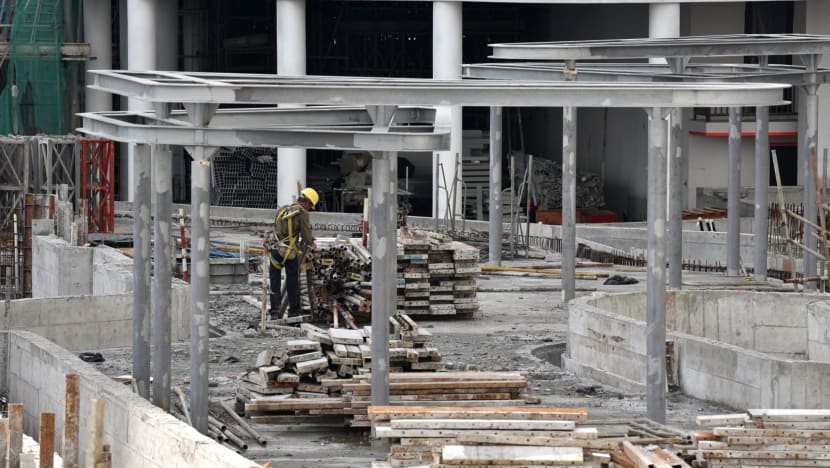BTO projects expected 'to be delayed' by a year or more due to tightened COVID-19 border measures

File photo of a HDB BTO under construction (Photo: Jeremy Long)
SINGAPORE: Many Build-to-Order (BTO) housing projects are expected to be delayed by a year or more, as a result of tighter border measures affecting the construction sector, said Education Minister Lawrence Wong in Parliament on Tuesday (May 11).
These tightened measures include longer Stay-Home Notice periods for all travellers from higher-risk places, and a ban on short-term visitors and long-term pass holders with recent travel history from India, Bangladesh, Nepal, Pakistan and Sri Lanka.
Delivering a ministerial statement on the Government’s response to the COVID-19 pandemic, Mr Wong acknowledged that many have called for even stricter rules to prevent infections from entering the country – but he said these moves have serious impacts on Singapore and Singaporeans.
In particular, contractors will be hit “especially hard”, and private home buyers may also face delays of varying lengths, said Mr Wong, who is also the co-chair of the multi-ministry task force dealing with COVID-19.
READ: Tighter COVID-19 measures important as Singapore is on knife-edge: Lawrence Wong
READ: The Big Read: Rising prices, building delays — young couples face perfect storm in quest for home sweet home
“Likewise companies in the marine and process sectors will be badly affected. They will find it hard to deliver their existing projects on time, and a few may even have to forgo new opportunities and projects.
“These are important sectors that we have taken decades to build – they hire thousands of Singaporean engineers and executives, and remain crucial sources of highly-skilled jobs,” Mr Wong said.
"CASCADING EFFECT"
The manpower crunch will have a “cascading effect” on the entire economy, he added, noting that any company seeking to bring in any workers from higher-risk countries face considerable delays – as the waiting time for an entry approval could stretch beyond six months.
“Our big concern is that if companies continue to face difficulties or are forced to close, we could then end up with higher unemployment and job losses for Singaporeans,” he said.
READ: Singapore residents travelling during COVID-19 – the risks and payoffs of reuniting with loved ones
From a societal point of view, Mr Wong said the stricter border measures mean Singaporeans would find it harder to reunite with their families abroad, while those looking for new foreign domestic workers (FDWs) would have to wait for at least two months.
“These are the consequences of keeping our borders tight, and I hope Members will help to explain this to your constituents when you receive appeals,” he said.
CONTROL OF BORDER MEASURES IS “DYNAMIC PROCESS”
Mr Wong also said that the control over the flow of travellers into Singapore is a “dynamic process”, based on assessments of each country’s public health situation.
He noted that before the pandemic, about 200,000 travellers went through Changi Airport each day. By November last year, this had plummeted to 820 arrivals a day.
Between December and March this year, there were about 1,200 arrivals each day.
The reason for this increase: Singapore was taking in more FDWs and migrant workers in the construction, marine and process (CMP) sector, he said.
But even so, Mr Wong said the inflow of CMP workers allowed up to now is still unable to meet Singapore’s needs.
READ: Companies seek alternatives as workers from India, Bangladesh dwindle
“Because every day, every week, every month, many migrant workers have left to go back to their home countries. Whatever numbers we are bringing in barely replace those who have left."
In the meantime, authorities will do more to assist the CMP sector which is bearing the brunt of the impact, he said. For instance, firms in this sector will receive higher foreign worker levy rebates from May to December this year.
READ: Higher foreign worker levy rebates as COVID-19 measures tighten labour supply
Beyond this sector and aviation and tourism-related segments, Mr Wong said there are signs of improvement in the broader economy.
Barring any setbacks and provided that Singapore can keep the COVID-19 situation under control, the country should be able to continue its recovery trajectory, he said.
But he cautioned that the outlook remains uncertain. In the meantime, authorities will monitor the situation closely, and consider how best to support those who need help to adjust, he said.
At the same time, he said businesses need to be more agile and start “factoring the need to pivot plans or operating models at short notice".
BOOKMARK THIS: Our comprehensive coverage of the coronavirus outbreak and its developments
Download our app or subscribe to our Telegram channel for the latest updates on the coronavirus outbreak: https://cna.asia/telegram












